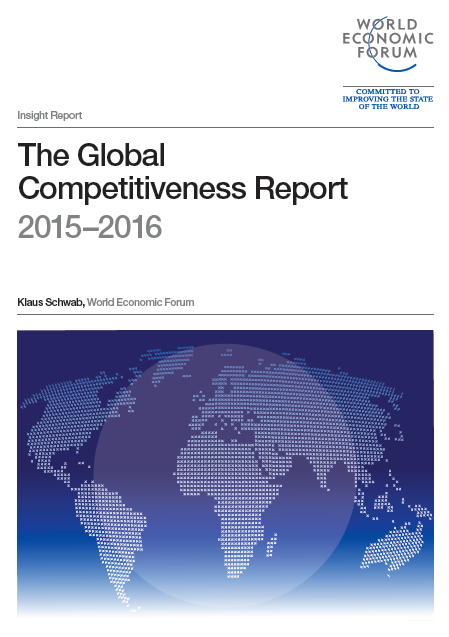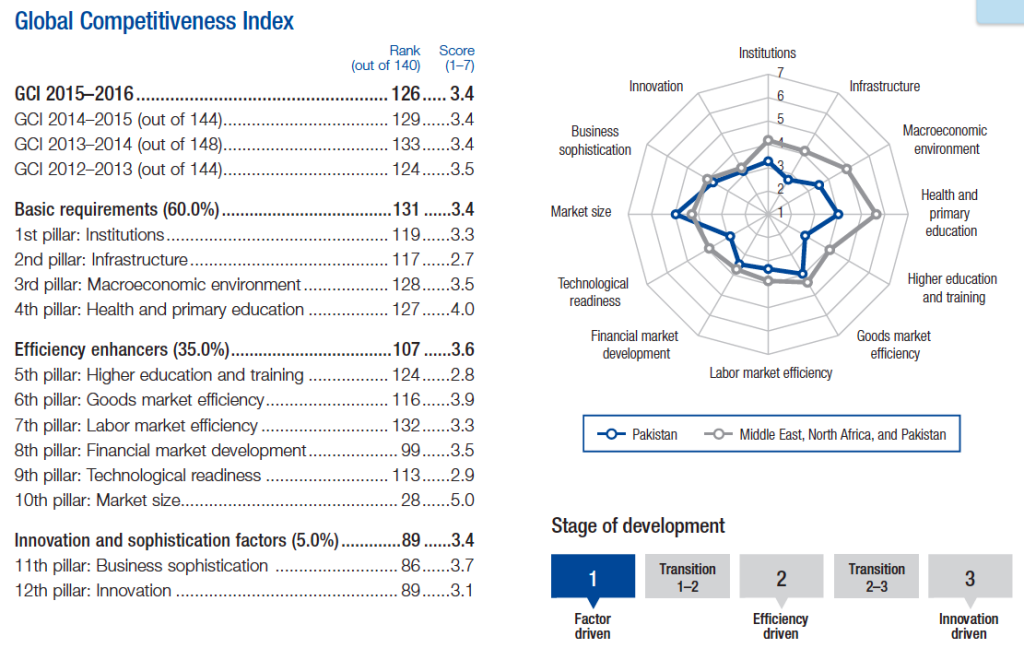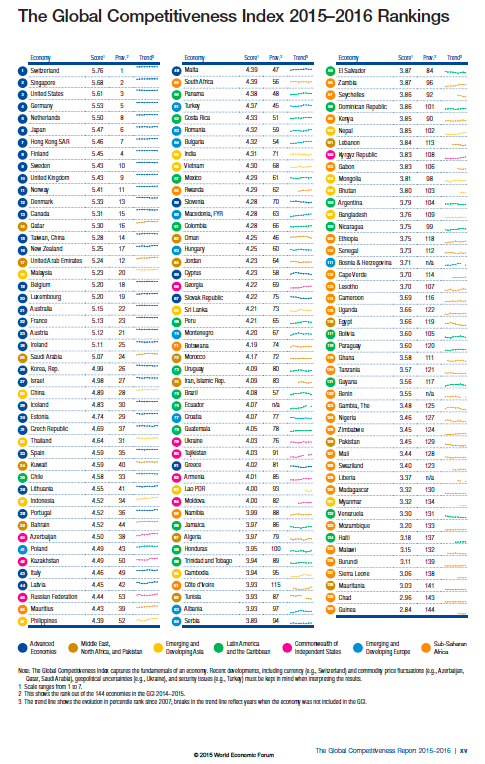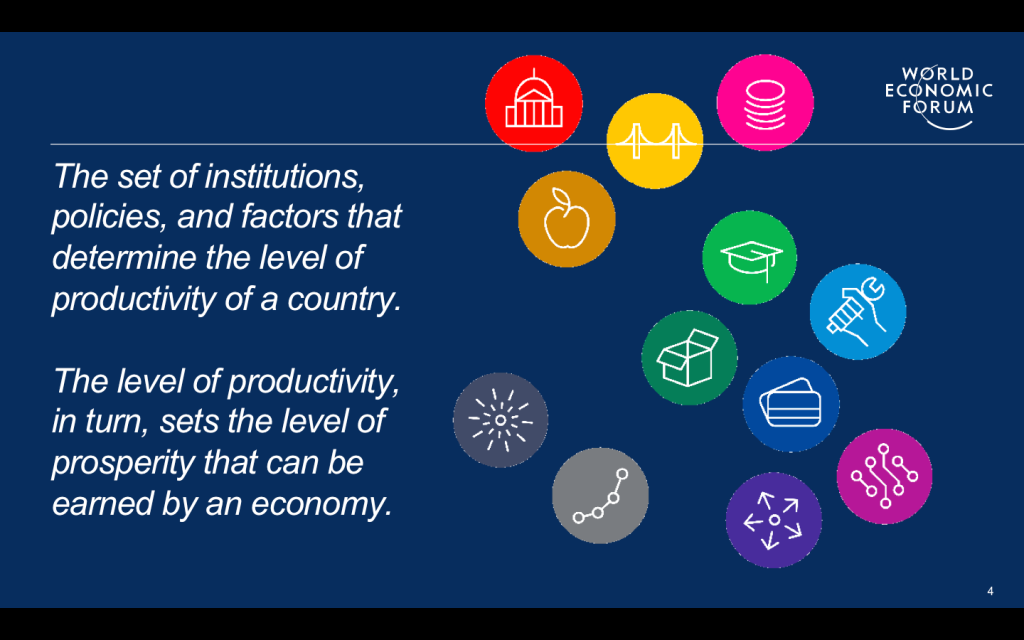Pakistan Shows Improvements on the Global Competitiveness Report 2015 – 2016 of the World Economic Forum.
Pakistan showcases improvements of three ranks by attaining the position of 126, as compared to 129 in 2014 among 140 countries. (Pakistan's Scorecard on GCR 2015 - 2016)
The Government fails to improve regulatory bodies for more effective and efficient governance in the country.
Corruption tops as the most problematic factor for doing business in Pakistan.
A failure to embrace long-term structural reforms that boost productivity and free up entrepreneurial talent is harming the global economy’s ability to improve living standards, solve persistently high unemployment and generate adequate resilience for future economic downturns, according to The Global Competitiveness Report 2015-2016, which is released today.
The report is an annual assessment of the factors driving productivity and prosperity in 140 countries. This year’s edition found a correlation between highly competitive countries and those that have either withstood the global economic crisis or made a swift recovery from it. The failure, particularly by emerging markets, to improve competitiveness since the recession suggests future shocks to the global economy could have deep and protracted consequences.
Pakistan has shown resilience in improving macro-economic indicators in the basic requirement pillars, while the pillars for efficiency enhancers, innovation and sophistication have shown weaknesses over the last one-year.

- Amir Jahangir
“The gains have been significant, however institutional weaknesses have hampered Pakistan’s progress to achieve its true potential. Most of the institutions have shown deterioration in their performance and ranking except a few”, said Amir Jahangir, Chief Executive Officer, Mishal Pakistan, the Partner Institute of Global Competitiveness and Benchmarking Network, World Economic Forum. .
On the twelve pillars of the Global Competitiveness Index Pakistan scored as following; Institutions 119, Infrastructure 117, Macroeconomic environment 128, Health and primary education 127, Higher education and training 124, Goods market efficiency 116, Labor market efficiency 132, Financial market efficiency 99, Technological readiness 113, Market size 28, Business sophistication 86 and Innovation 89
The government has been successful in improving the burden of government regulation from 103 in 2014 to an impressive 86 in 2015. Pakistan also improved the general government budget balance as percentage of the GDP by improving 28 ranks and securing 106th position.
While the indicators for quality of education system (75) has improved, availability of Internet access in schools has deteriorated to 103 this year from 89 in 2014. This signifies the widening gap between multiple education systems prevailing in the country.
Pakistan also benefited from its 3G and 4G rollout in the telecommunication sector, where the country improved on foreign direct investment and technology transfer indicator by 13 ranks and sits at 77 rank among 140 countries. Similarly the indicator for government’s procurement of advanced tech products has shown an improvement on 46 ranks, from 98 in 2014 to 52 in 2015.
 |
|
The Judicial independence has lost its ranking of 67 last year to 82 in 2015. The governments have shown greater favoritism in decisions of government officials ranking at 101 this year, where Pakistan lost 26 ranks.
Under the goods market efficiency Pakistan lost solid 16 ranks, where the extent of market dominance, which measures the characteristic of corporate activities has gone from 71 in 2014 to 110 in 2015. Similarly the performance of the Competition Commission of Pakistan’s effectiveness of anti-monopoly policy has gone from bad to worst 85 in 2014 to 106 in 2015. Similarly the performance of the Federal Bureau of Revenue (FBR) has also been on the decline, with major indicators showing poor performance over the last year; burden of customs procedures has been ranked at 111 this year as compared to 87 in 2014.
Similarly the various regulatory bodies have shown weak governance indicators, losing ranks to other emerging markets. The Accountant General of Pakistan on the strength of accounting and reporting strength has gone from the rank of 90 in the last year to 117 in 2015. The Securities and Exchange Commission of Pakistan, which gained success in the last few years has proved to be weak and ineffective for the last one year, as it lost 42 ranks, SECP ranks now at 93 as compared to 71 in 2014 among 140 regulators of security exchanges globally.
First place in the GCI rankings, for the seventh consecutive year, goes to Switzerland. Its strong performance in all 12 pillars of the index explains its remarkable resilience throughout the crisis and subsequent shocks. Singapore remains in 2nd place and the United States 3rd. Germany improves by one place to 4th and the Netherlands returns to the 5th place it held three years ago. Japan (6th) and Hong Kong SAR (7th) follow, both stable. Finland falls to 8th place – its lowest position ever – followed by Sweden (9th). The United Kingdom rounds up the top 10 of the most competitive economies in the world.

- The Global Competitiveness Index 2015–2016 Rankings
Among the members of the South Asian Association for Regional Cooperation (SAARC) India leads the way at 55th, followed by Sri Lanka (68th, up five). Nepal (100th, up two), Bhutan (105th, down two), Bangladesh (107th, up two), and Pakistan (126th, up three) all rank 100th or below. Although last year all SAARC countries except Bhutan posted small gains, since 2007 only Nepal has managed to progress significantly (14 places gained); Pakistan lost 34 places during that period and India, despite leapfrogging 16 places this year, still ranks seven notches lower than it did in 2007.

- Competitiveness
The report’s Global Competitiveness Index (GCI) also finds a close link between competitiveness and an economy’s ability to nurture, attract, leverage and support talent. The top-ranking countries all fare well in this regard. But in many countries, too few people have access to high-quality education and training, and labour markets are not flexible enough.
The Global Competitiveness Report 2015–2016 is being launched at a pivotal time for the global economy. On the one hand, economic development is characterized by the “new normal” of higher unemployment, lower productivity growth, and subdued economic growth that could still be derailed by uncertainties such as geopolitical tensions, the future path of emerging markets, energy prices, and currency changes. On the other hand, other recent developments show great promise - the so-called fourth industrial revolution and new ways of consuming such as the sharing economy could lead to another wave of significant innovations that drive growth. At the same time, across countries we are witnessing economic policymaking become increasingly people-centered and embedded in overall societal goals.
The fourth industrial revolution is facilitating the rise of completely new industries and economic models and the rapid decline of

- Klaus Schwab
others. To remain competitive in this new economic landscape will require greater emphasis than ever before on key drivers of productivity, such as talent and innovation," said Klaus Schwab, Founder and Executive Chairman of the World Economic Forum.
“The new normal of slow productivity growth poses a grave threat to the global economy and seriously impacts the world’s ability to tackle key challenges such as unemployment and income inequality. The best way to address this is for leaders to prioritize reform and investment in areas such as innovation and labour markets; this will free up entrepreneurial talent and allow human capital to flourish,” said Xavier Sala-i-Martin, Professor of Economics at Columbia University.